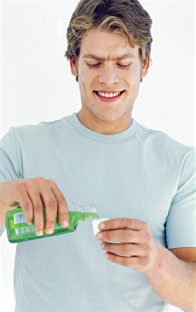Mouthrinses
They do work — if you match the right mouthrinse to your dental need.
Dear Doctor,
I often walk through the drugstore and see shelves loaded with so many different kinds of mouthwashes and wondered — do any of these really work?

Dear Matt,
When considering whether or not a mouthrinse “works” it is important to first consider what you hope to accomplish by using it. There are a staggering number of mouthrinses available; in a broad sense it is useful to classify mouthrinses as either therapeutic or cosmetic.
Cosmetic rinses may impart a pleasant taste or mentholated smell, but whether they “work” or not depends only on if you enjoy the experience. The effects of cosmetic rinses are temporary; they do not contribute to improving oral health. Having said that, it is important to acknowledge that just because something is purely cosmetic does not mean that it isn't of value. There is certainly nothing wrong with masking unpleasant breath as long as that is all you expect it to do.
Therapeutic mouthrinses are those that do improve your oral health in some way. These can be classified as anti-cariogenic (preventing decay), or anti-bacterial.
You can be assured that using the right mouthrinse can make a positive impact on your dental health.
Let's first consider the over the counter, (OTC) anti-cariogenic mouthrinses available for purchase at the drugstore. By and large these are fluoride rinses that provide .05% sodium fluoride. When considering the effectiveness of mouthrinses these sodium fluoride rinses are super stars. There are many research studies that have shown that by consistently using a sodium fluoride rinse in combination with good oral hygiene the likelihood of developing new cavities is significantly reduced. There are few people (over the age of six) who would not receive some benefit from the daily use of a fluoride rinse.
Popularly known non-prescription (OTC) anti-bacterial mouthrinses contain a variety of active ingredients including triclosan, sanguinaria extract, zinc, or essential oils such as menthol and others. Each of these ingredients does help to reduce the bacteria in plaque to some degree, which can lead to the reduction of gingivitis (inflammation of the gums) and bad breath when used in combination with brushing and flossing.
Chlorhexidine, a prescription only mouthrinse, is the ingredient that has been most widely used and studied. It is effective for the control of both gingivitis and tooth decay. Chlorhexidine prevents bacteria from sticking to the teeth and therefore plaque formation. It has been used for decades as a post-oral surgery rinse, or when it is otherwise not possible to carry out effective personal plaque control. Chlorhexidine does have a tendency to stain teeth in some people, although it is removable by ultrasonic scaling and/or polishing.
The best source of information tailored specifically for you and your mouth is your dentist and dental hygienist.
More recently chlorhexidine mouthrinses have been used in combination with (OTC) fluoride rinses to reduce high rates of decay.
Hopefully this helps sort through the numerous bottles of attractive colored liquids called mouthrinses at your drug store. However, the best source of information tailored specifically for you and your mouth is your dentist and dental hygienist. At your next visit ask if you would benefit from the addition of a mouthrinse to your oral hygiene routine.




